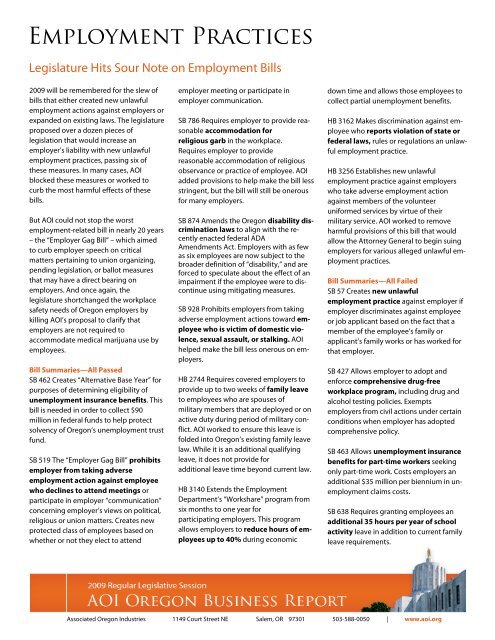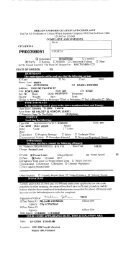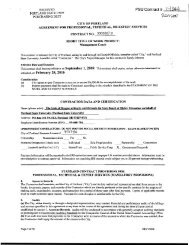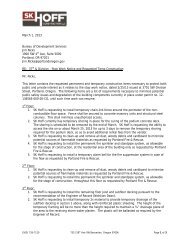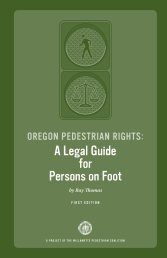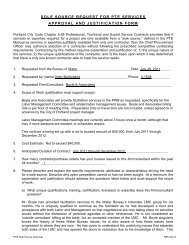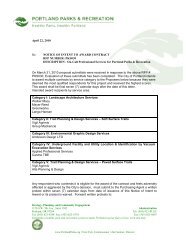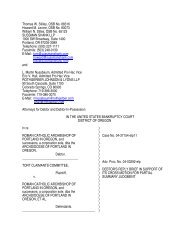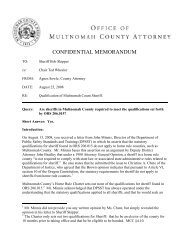AOI OREGON BUSINESS REPORT
AOI OREGON BUSINESS REPORT
AOI OREGON BUSINESS REPORT
Create successful ePaper yourself
Turn your PDF publications into a flip-book with our unique Google optimized e-Paper software.
Employment Practices<br />
Legislature Hits Sour Note on Employment Bills<br />
2009 will be remembered for the slew of<br />
bills that either created new unlawful<br />
employment actions against employers or<br />
expanded on existing laws. The legislature<br />
proposed over a dozen pieces of<br />
legislation that would increase an<br />
employer’s liability with new unlawful<br />
employment practices, passing six of<br />
these measures. In many cases, <strong>AOI</strong><br />
blocked these measures or worked to<br />
curb the most harmful effects of these<br />
bills.<br />
But <strong>AOI</strong> could not stop the worst<br />
employment-related bill in nearly 20 years<br />
– the “Employer Gag Bill” – which aimed<br />
to curb employer speech on critical<br />
matters pertaining to union organizing,<br />
pending legislation, or ballot measures<br />
that may have a direct bearing on<br />
employers. And once again, the<br />
legislature shortchanged the workplace<br />
safety needs of Oregon employers by<br />
killing <strong>AOI</strong>’s proposal to clarify that<br />
employers are not required to<br />
accommodate medical marijuana use by<br />
employees.<br />
Bill Summaries—All Passed<br />
SB 462 Creates “Alternative Base Year” for<br />
purposes of determining eligibility of<br />
unemployment insurance benefits. This<br />
bill is needed in order to collect $90<br />
million in federal funds to help protect<br />
solvency of Oregon’s unemployment trust<br />
fund.<br />
SB 519 The “Employer Gag Bill” prohibits<br />
employer from taking adverse<br />
employment action against employee<br />
who declines to attend meetings or<br />
participate in employer “communication”<br />
concerning employer’s views on political,<br />
religious or union matters. Creates new<br />
protected class of employees based on<br />
whether or not they elect to attend<br />
employer meeting or participate in<br />
employer communication.<br />
SB 786 Requires employer to provide reasonable<br />
accommodation for<br />
religious garb in the workplace.<br />
Requires employer to provide<br />
reasonable accommodation of religious<br />
observance or practice of employee. <strong>AOI</strong><br />
added provisions to help make the bill less<br />
stringent, but the bill will still be onerous<br />
for many employers.<br />
SB 874 Amends the Oregon disability discrimination<br />
laws to align with the recently<br />
enacted federal ADA<br />
Amendments Act. Employers with as few<br />
as six employees are now subject to the<br />
broader definition of “disability,” and are<br />
forced to speculate about the effect of an<br />
impairment if the employee were to discontinue<br />
using mitigating measures.<br />
SB 928 Prohibits employers from taking<br />
adverse employment actions toward employee<br />
who is victim of domestic violence,<br />
sexual assault, or stalking. <strong>AOI</strong><br />
helped make the bill less onerous on employers.<br />
HB 2744 Requires covered employers to<br />
provide up to two weeks of family leave<br />
to employees who are spouses of<br />
military members that are deployed or on<br />
active duty during period of military conflict.<br />
<strong>AOI</strong> worked to ensure this leave is<br />
folded into Oregon’s existing family leave<br />
law. While it is an additional qualifying<br />
leave, it does not provide for<br />
additional leave time beyond current law.<br />
HB 3140 Extends the Employment<br />
Department’s “Workshare” program from<br />
six months to one year for<br />
participating employers. This program<br />
allows employers to reduce hours of employees<br />
up to 40% during economic<br />
down time and allows those employees to<br />
collect partial unemployment benefits.<br />
HB 3162 Makes discrimination against employee<br />
who reports violation of state or<br />
federal laws, rules or regulations an unlawful<br />
employment practice.<br />
HB 3256 Establishes new unlawful<br />
employment practice against employers<br />
who take adverse employment action<br />
against members of the volunteer<br />
uniformed services by virtue of their<br />
military service. <strong>AOI</strong> worked to remove<br />
harmful provisions of this bill that would<br />
allow the Attorney General to begin suing<br />
employers for various alleged unlawful employment<br />
practices.<br />
Bill Summaries—All Failed<br />
SB 57 Creates new unlawful<br />
employment practice against employer if<br />
employer discriminates against employee<br />
or job applicant based on the fact that a<br />
member of the employee’s family or<br />
applicant’s family works or has worked for<br />
that employer.<br />
SB 427 Allows employer to adopt and<br />
enforce comprehensive drug-free<br />
workplace program, including drug and<br />
alcohol testing policies. Exempts<br />
employers from civil actions under certain<br />
conditions when employer has adopted<br />
comprehensive policy.<br />
SB 463 Allows unemployment insurance<br />
benefits for part-time workers seeking<br />
only part-time work. Costs employers an<br />
additional $35 million per biennium in unemployment<br />
claims costs.<br />
SB 638 Requires granting employees an<br />
additional 35 hours per year of school<br />
activity leave in addition to current family<br />
leave requirements.<br />
15<br />
Associated Oregon Industries 1149 Court Street NE Salem, OR 97301 503-588-0050 | www.aoi.org


